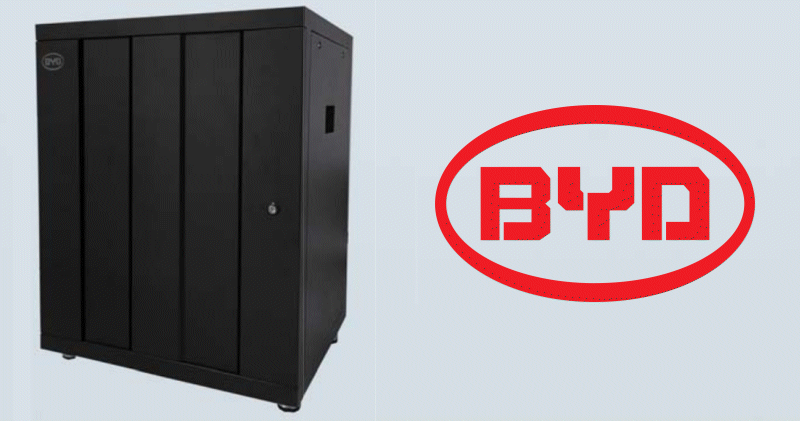Choices of battery systems continue to grow in South Australia’s Home Battery Scheme, with BYD the latest to be added to the list.
BYD (which stands for Build Your Dreams) is a huge Chinese company headquartered in Shenzhen that boasts 240,000 employees globally. Founded in 1995, BYD manufactures solar panels and battery systems, LEDs, electric forklifts, electric cars, monorail systems and electric buses. The company has established more than 30 industrial parks across six continents.
BYD B-Box Pro 13.8 Specifications
We haven’t added the BYD B-Box Pro 13.8 to our solar battery storage comparison page yet – but other SA Home Battery scheme approved units can be found on it.
BYD’s web site isn’t particularly helpful with regard to specifications – it doesn’t provide much detail and the user manual PDF is busted. The SA Home Battery Scheme web site indicates the BYD B-Box Pro 13.8’s capacity as being 55.20kWh; which isn’t correct.
A datasheet from 2017 reveals the following information:
- Battery chemistry: LiFePO4 – (lithium iron phosphate – considered the safest of Li-ion chemistries)
- Usable capacity: 13.8 kWh
- Maximum output power: 12.8kW
- Peak output power: 13.3kW (60 seconds)
- Round-trip efficiency: ≥95.3% under test conditions
- Dimensions: 650×800×550mm
- Net weight: 175 kg
- Warranty: 10 years
- Ambient temperature range: -10 ~ +50C
- Compatible inverters: SMA, Goodwe, Solax, Victron
Up to 32 BYD B-Box Pro 13.8 battery systems can be connected in parallel – so storage capacity of 440kWh, which is just a little bit of overkill for the average household – still, the ability is there.
We’ll endeavour to get the latest datasheet, warranty and current pricing details into our battery comparison table soon.
—-
Update 18 January – BYD B-Box Pro 13.8 has been added to the table.
—–
Other SA Home Battery Scheme Approved Systems
After initially being limited to battery systems that are (or will be) manufactured/assembled in South Australia, on December 31 2018 other manufacturers began getting a look in. In addition to BYD, at the time of publishing the manufacturers with skin in the game are:
As well as systems being eligible, they must be installed by an approved system provider.
South Australia’s Home Battery scheme offers subsidies of up to $6,000, with the level of subsidy provided based on storage capacity. A $600 per kilowatt hour subsidy is available to South Australian concession holders and $500 per kilowatt hour other households – further details on the subsidy here.


 RSS - Posts
RSS - Posts



Michael – specifications here:
http://en.byd.com/energy/download/low-voltage/B-Box%20Low%20Voltage%20Specification.pdf
but the user manual doesn’t load.
BYD B Box is interesting because its LiFePO4. It does seem that they’re shooting themselves in the foot by offering discharge rates close to 1C. In the case of the B-Box Pro 13.8 it’s say 13.8kW peak but 12.8kW continuous. However, at least for the original B-Box Res the warranty only promised 60% capacity after 10 years. There is no warranty info on the new B-Box Pro yet, apart from the fact that it’s 10 years, but bottom line – expensive to get an inverter capable of delivering 12.8kW continuous so why not limit the output and make the warranty more appealing? And more in line with the competition.
“Update 18 January – BYD B-Box Pro 13.8 has been added to the table.”
On 2019-11-03, I did not see it (or the LG Chem 13kWH battery) in the table.
If you go to the top of BYD column where is says “BYD B-Box RES” you’ll see there is a triangle pointing down. If you click on that you can change the battery system displayed to a B-Box Pro. You can also do that with the LG Chem Batteries, but the their 13kWh battery isn’t there. I’ll check to see if it’s still available.
Sorry – I had not realised that.
I note also that that applies to the DCS column, which shows (although, from what you have said regarding DCS, at
https://www.solarquotes.com.au/blog/dcs-solar-batteries/?unapproved=526743&moderation-hash=2eec5268647f1f9ef62bec60cbf6a1f0#comment-526743
the information about their battery range, in the table, may be not current) that (at the time it was published, DCS had also, a 13kW battery.
Now, a particular aspect of all of this, is that, from the table, the BYD B Box Pro 13.8, and the DCS PV 13.5, have, respectively, “Cost per Total warranted kWh (1 cycle per day)) of 22 cents and 20 cents.
The significance of these two figures, is that, given that the gap between the current, single flat charge for residential grid electricity usage for Synergy in WA (the SWIS grid), and the Feed in Tariff, is 28.82 – 7.135 = 21.685; close enough to 22 cents, the issue of whether storage batteries for PV systems, is economically feasible, changes, I think.
So, with many of the entries in the table, showing “Entry Last Updated” value of “Pre-October 2018”, and, given changes to both electricity prices (quite apart from the states/territories that have, and, may have changed, financial assistance for getting PV ESS battery storage), and, the prices and availability of applicable batteries, both the table entries, and, the question of the economic feasibility of getting PV ESS battery storage, need to be reviewed and updated, although, the apparently murky and prohibitive, new standards for PV ESS battery storage installation, appear to require a cold war, nuclear war bunker, for PV ESS battery storage, making the new standard, an apparent attempt to prohibit PV ESS battery storage.
Is the BYD BOX Pro 13.8 the same as the BYD 13.8KW Rapid Charge LITHIUM Ion Battery??
Hi Sue
As far as I am aware it is the same thing. The BYD BOX Pro 13.8 is considered a rapid charge battery as it can fully discharge or fully charge in a little over one hour.